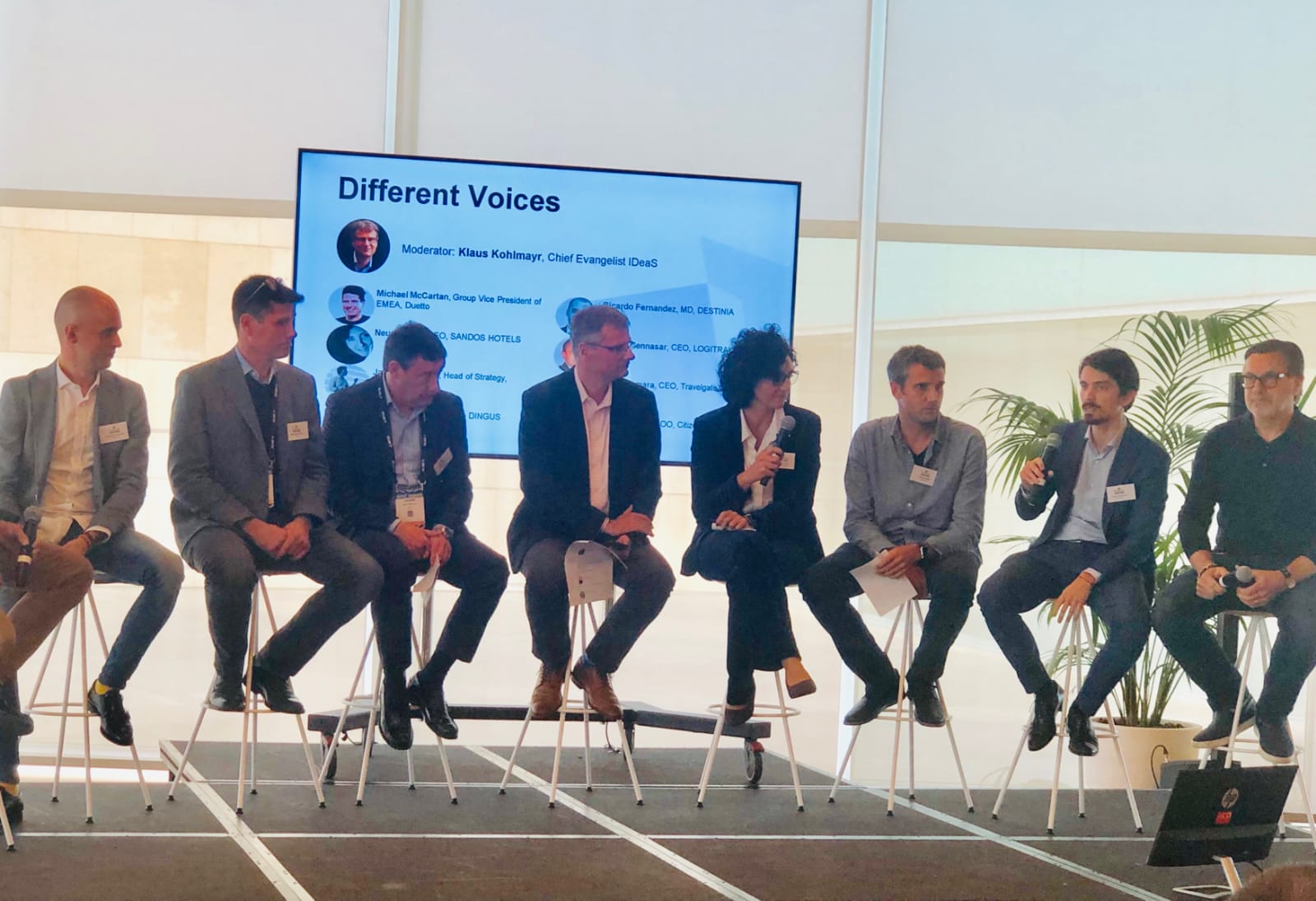Distribution Channels: TravelgateX participates in the conference of HSMAI ROC Europe 2019
Posted by
Vero

“We can help any company, hotel or distributor optimize their sales”
Pedro Camara, CEO of TravelgatgeX participated in the round table with CEOs and industry leaders related to the impact of tourism distribution.
This panel discussed the complexity of distribution channels and the battle for customers that is being waged both online and offline. More and more customers are in need of more relevant information, in real time and within reach. At the same time, the margins of the hotel are under pressure. Labor costs in some markets are increasing at twice the rate of increase in income. Acquisition costs also increase, and hotels increasingly have less time.
The curve of technological innovation is accelerating. Forced by OTAs and driven by consumer expectations, hotels have been pressured to accelerate investment in technology, some of which may be outdated in a few years.
At the HSMAI round table, Pedro Camara, CEO of TravelgateX, answered some questions related to the distribution with the representatives of Sandos Hotel, CitizenM, Dingus, Destinia and Logitravel.
In Europe, there’s an emergence of several API based startups which make it very easy to exchange data. TravelgateX has been very successful in connecting the industry, how you do see the new landscape emerging and how will it help revenue managers.
- Yes, we have been connecting the different players in the industry for the past 7 years. What seemed crazy then, today is standard practice, and we’ve been lucky enough to be at the right time at the right moment when connectivity started to grow and be a thing. But right now, connectivity is only a commodity, in my opinion, we are living now in the era of data. Any company today, from any industry, must make use of data to optimize their business or even to be able to stay in business. Nowadays, technology has advanced so that every transaction can be tracked and analyzed. We, at TravelgateX, are managing more than 2 billion searches each day translating into more than 20k bookings. We generate about 2 TB of data each day. While these are quite large numbers for such a small company like ourselves, the real trick or challenge here is to make this data useful without having to sell a lung to pay for it.
Anyone throughout the value chain, from the hotel to the OTA or end distributor can benefit from the insights this data can provide. We have been approached by investment companies willing to use this data to help decide on whether to invest in a property or destination.

Going back to your question, the mission of revenue managers is to maximize the occupation while keeping the highest price available. The data we generate is crucial to help them to achieve just that.
We know who’s searching what, when, how much it costs for each room type for each different meal plan, how much the competition is selling for, who’s buying, from where, when they’re coming, which hotels are full, and which ones are still available.
We connect to more than 600 sources in real time, and while this data is completely anonymized for compliance issues, it makes the job of a revenue manager much more manageable.
Revenue Managers can forecast their sales based on this data. It’s crucial to not only look at the past to decide on what to do but also to look at the future and foresee what’s coming to make more precise and informed decisions.
We’re also working on a pilot for automatic pricing to make it even more productive and beneficial for hotel chains or anyone interested in optimizing sales & revenue.
Channel optimization
Measuring profitability by channel isn’t rocket science….Where do you think most hoteliers go wrong and what advice do you have for hotels looking to get a stronger understanding of channel optimization?
- I don’t think it’s rocket science either, but at the same time you have to know what you’re doing, how to do it and you have to understand that it’s not going to be cheap. Only by the use of data hoteliers will be able to understand how their distribution channels are performing. And this data has to be collected from many sources and correctly displayed so trends and patterns can be identified. We have been struggling with this technical issue for a few years now, and only now, and 4 years later we’ve been able to crack it, meaning we can actually afford to collect, store and analyze the data. But it has been a long and expensive journey, with a very steep learning curve. But now I’m happy to say that we can help any company, hotel or distributor, to optimize their sales just by keeping track of dashboards we have prepared for each customer segment.
When it comes to hotel distribution, what is one thing that most hotel owners or operators believe to be true that is actually false?
- I would have to say that the most common myth is that direct distribution is actually more profitable. The globalized world we live today together with the big behemoths such as Google, Facebook, Amazon or even Booking tends to be more and more centralized. I’m a firm believer in focus. At TravelgateX, we are entirely focused on travel connectivity. It’s the only thing we do. We connect and optimize connectivity. Nothing else. This is how we managed to grow 2x every year and this year we expect to multiply by 3. As a hotelier, I would focus on my hotels, at giving my clients the best experience ever, optimizing my operational costs and leaving the distribution to the distribution channels. Marketing is expensive, technology is also expensive, and it only gets cheaper when bought in bulk. As a medium, small hotelier there’s no room for even trying to play that game. It’s over before it starts.
Technology and Innovation
What’s the most exciting recent technology or innovation in this space that wasn’t developed by your company?
- I love what a few startups are doing by trying to connect the people inside the hotels. From the bartender to the head chef, from the pool guy to the suppliers. There’s a startup called Chartok who’s doing just that — re-inventing how hotels communicate in the inside, to make sure that all the knowledge that employees gather over the years doesn’t get lost. I think it’s a brilliant idea and something the market has been needing for a long time.
What’s the most important thing that you’ve learned in the last 6 months.
-
Nothing lasts forever. I know it sounds a bit cliche especially for someone who’s already left their 30s, but it as true today as it’s always been. Enjoy the moment, take care of what you have right now because if you don’t, it might not be there after a while, and you will miss it. We tend to take things for granted, especially when there’re no problems or visible issues at the surface. But you have to dig down and try and see if it’s really as good as it seems or if there’s some underlying issue there that you’re not seeing. Looking at our company, we’re investing a lot of resources in innovation. It’s only a question of time that someone bigger, smarter and with more money will come and completely change the rules of the game. And we have to be prepared and one step ahead to minimize the impact it could have on our company.
How will the hospitality landscape look in the next 5 years?
Consolidation: The big ones will only get bigger by acquiring smaller competitors or taking them out of business. It’s not going to get any easier.
New entrants: There’s a lot of things going on in the startup scene, and it doesn’t seem that it will change. With the big ones getting bigger, there’s always room for someone to innovate in some areas, solve a problem in a slightly better way and get acquired by a big company. Everyone is happy.
New distribution models: I firmly believe in a decentralized model. It’s not going to be easy for a company to set the standard and convincing the industry, but as the big ones get bigger, the only way to compete with them is not by playing their own game, you can’t beat them. De-centralisation is my bet on how to beat them.
Did you see any shifts in consumer behavior?
-
I just visited China a few months ago, and I was able to see how people are using their phone — basically for everything! With services like Alipay and WeChat, you’re ready to pay for a taxi or your groceries at the store. Mobile will only keep on growing and having more importance in our everyday lives, and not many things will be possible without one.